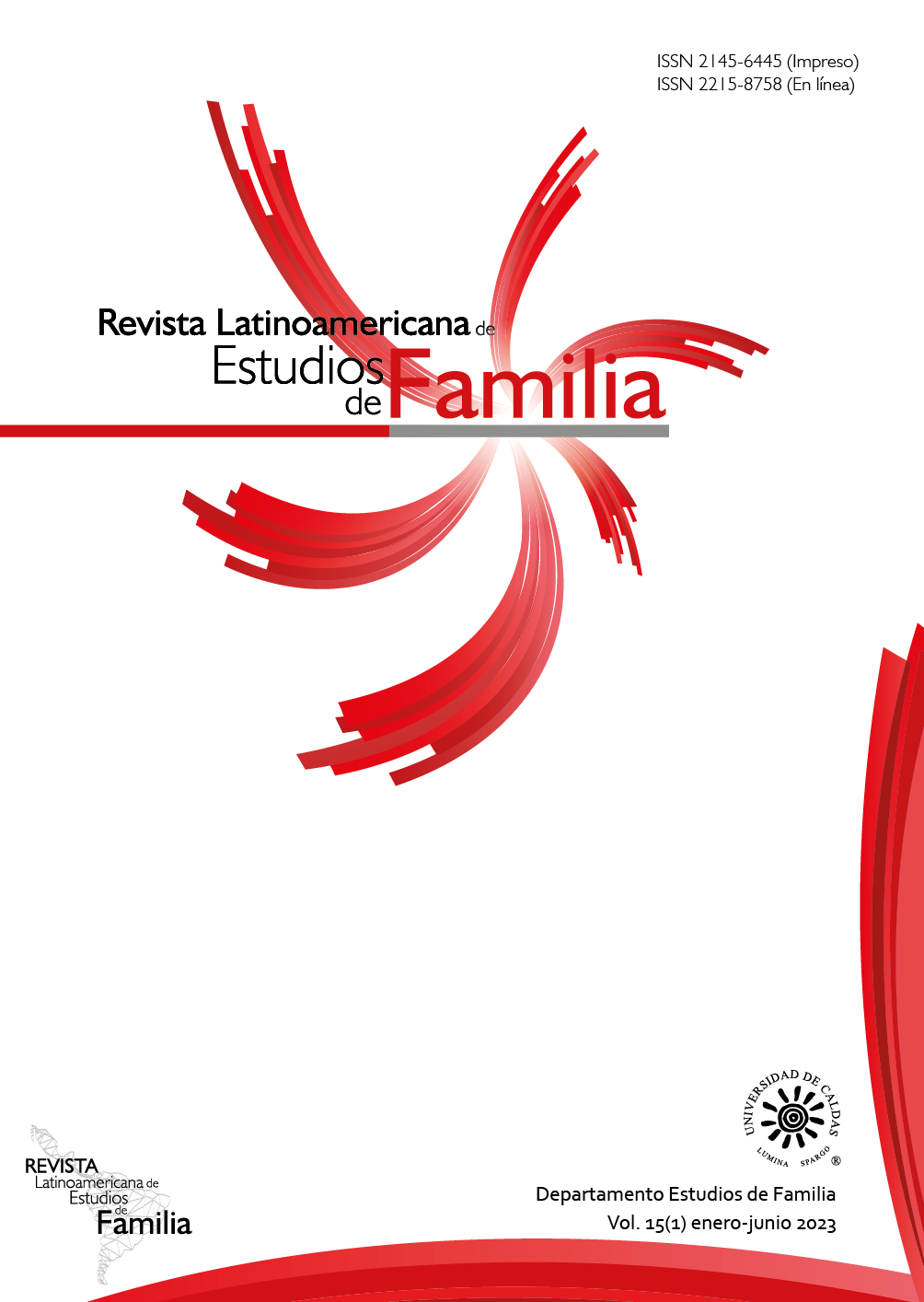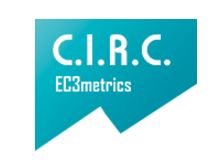Authors
Abstract
Abstract. Adolescence is a transition stage that includes physical, cognitive, emotional, behavioral and social changes. Because of this, the role of parents during this stage is very comple, and the stability and balance of these factors are subject to the type of relationship and communication that parents have established with their children. Objective: to describe the effects of parental communication practices on internalizing behaviors from the perspective of a group of adolescents belonging to an educational institution in Medellín (Antioquia). Methodology: a qualitative approach was used with a descriptive-comprehensive phenomenological design. The applied instrument was the semistructured interview and the focus group had a sample of nine participants. Results: it was found that adolescents who presented depressive behaviors such as low mood, sadness, feelings of loneliness and insecurity, demotivation, low self-esteem and anxiety showed little closeness with parents, “cohesion” perceived in the lack of affective expressions by them. Among the findings, it was found that adolescents who manifested experiences of parental communication from “inflexibility” (imposition of rules with rigid expressions, rigid tones, threats of punishment and communication imposed by the parents) presented internal behaviors of depression, anxiety and unsafety. Conclusions: one of the aspects that influences the well-being and quality of life of adolescents are parental communication practices, reason why the importance of psychoeducation for parents in relation to these skills and family functioning was highlighted.
References
Álvarez, J., Ramírez, L. y Giraldo, C. (2019). Maternar y paternar: transformando prácticas de autoridad, comunicación y cercanía vinculante. Revista Latinoamericana de Estudios de Familia, 11(1), 48-65. https://doi.org/10.17151/rlef.2019.11.1.4
Arellanos, O. y Arellanos, R. (2019). Estrategias comunicativas en la relación de padres e hijos adolescentes. Revista de la Universidad Internacional del Ecuador, 4(2), 32-44. https://doi.org/10.33890/innova.v4.n2.2019.1005
Asociación Médica Mundial. (2017). Declaración de Helsinki de la AMM- Principios Éticos para las Investigaciones Médicas en seres Humanos. https://bit.ly/3CrkAiY
Barboza, M., Moori, I., Zárate, S., López, A., Muñoz, K. y Ramos, S. (2017). Influencia de la dinámica familiar percibida en el proyecto de vida en escolares de una institución educativa de Lima. Psicología Escolar e Educacional, 21(2), 157-166. https://doi.org/10.1590/2175-3539201702121094
Beato, A., Pereira, A., Barros, L. & Muris, P. (2016). The Relationship Between Different Parenting Typologies in Fathers and Mothers and Children’s Anxiety. Journal of Child and Family Studies, 25(5), 691 - 1701. https://doi.org/10.1007/s10826-015-0337-x
Bernal-Martínez de Soria, A. (2016). La identidad de la familia: Un reto educativo. Perspectiva Educacional, Formación de Profesores, 55(1), 114-128. https://www.redalyc.org/pdf/3333/333343664008.pdf
Caqueo, A., Mena, P., Flores, J., Narea, M. y Irarrázaval, M. (2020). Problemas de regulación emocional y salud mental en adolescentes del norte de Chile. Terapia Psicológica, 38(2), 203-222. https://doi.org/10.4067/S0718-48082020000200203
CEUPE Magazine. (s.f ). Modelo Circumplejo de David Olson. https://bit.ly/3OJkMnq
Colegio Colombiano de Psicológos. (2009). Deontología y Bioética del ejercicio de la psicología en Colombia. Colegio Colombiano de Psicólogos. https://bit.ly/3C1MowM
Creswell, J. W. (2007). Qualitative inquiry and research design: Choosing among five approaches. Sage publications.
De Clercq, L. E., Soenens, B., M, D., Prinzi, P., Van der Kaap-Deeder, J., Beyers, W. & De Pauw, S. (2022). Parenting and Child Personality as Modifiers of the Psychosocial Development of Youth with Cerebral Palsy. Child Psychiatry and Human Development, 53(1), 137 - 155. https://doi.org/10.1007/s10578-020-01106-1
Dill, S., Schmidt, B., Böing, E. & Crepaldi, M. (2017). Conflitos Conjugais e Parentais em Famílias com Crianças: Características e Estratégias de Resolução. Paidéia, 27(1), 457-465. https://doi.org/10.1590/1982-432727s1201711
Dolev-Cohen, M. & Ricon, T. (2022). Dysfunctional Parent–Child Communication About Sexting During Adolescence. Archives of Sexual Behavior, 51(3), 1689-1702. https://doi.org/10.1007/s10508-022-02286-8
Galvis, L., Jaimes, M. y Osorio, E. (2022). Funcionalidad familiar de población en situación de vulnerabilidad, una mirada desde el modelo circumplejo de Olson: Estudio barrio Cormoranes Cúcuta - Colombia. Revista Boletín Redipe, 11(3), 289-300. https://doi.org/10.36260/rbr.v11i3.1721
Gómez, S., Matagira, G., Agudelo, M., Berbesi, D. y Morales, S. (2021). Cohesión familiar y factores relacionados en adolescentes escolarizados. Revista Universidad y Salud, 23(3), 198-206. https://doi.org/10.22267/rus.212303.233
González, O., Navarro, J., Ortiz, L., Alarcón, Y., Ascanio, C. y Trejos, A. (2019). Relación entre prácticas parentales y ajuste psicológico de adolescentes escolarizados. Archivos Venezolanos de Farmacología y Terapéutica, 38(5), 661-667. https://bit.ly/43wx4nr
Güemes, M., Ceñal, M. J. e Hidalgo, M. (2017). Desarrollo durante la adolescencia. Aspectos físicos, psicológicos y sociales. Pediatría Integral, 21(4), 233-244. https://bit.ly/43igvMw
Hogye, S., Jansen, P., Lucassen, N. & Keizer, R. (2022). The relation between harsh parenting and bullying involvement and the moderating role of child inhibitory control: A population-based study. Aggressive Behavior, 48(2), 141 - 151. https://doi.org/10.1002/ab.22014
Infante, A. y Martínez, J. (2016). Concepciones sobre la crianza: El pensamiento de madres y padres de familia. LIBERABIT. Revista Peruana de Psicología, 22(1), 31-41. https://doi.org/10.24265/liberabit.2016.v22n1.03
Ley 1098 del 2006. (noviembre 8). Por la cual se expide el Código de la Infancia y la Adolescencia. Diario Oficial n.º 46.446 del 8 de noviembre de 2006 y n. º46453 del 15 de noviembre de 2006.https://bit.ly/3OIiXas
Liu, C.-R., Wan, L.-P., Liu, B.-P., Jia, C.-X. & Liu, X. (2022). Depressive symptoms mediate the association between maternal authoritarian parenting and non-suicidal self-injury among Chinese adolescents. Journal of Affective Disorders, 305, 213 - 219. https://doi.org/10.1016/j.jad.2022.03.008
López-Soler, C., Alcántara, M., Fernández, V., Castro, M. y López, P. (2010). Características y prevalencia de los problemas de ansiedad, depresión y quejas somáticas en una muestra clínica infantil de 8 a 12 años, mediante el CBCL. Anales de psicología, 26(2), 325-334. https://bit.ly/45szuoS
Minisitro de Salud. (4 de octubre). Resolución Número 8430 de 1993. Por la cual se establecen las normas científicas, técnicas y administrativas para la investigación en salud. https://bit.ly/3FrC28Z
Olson, D. (2000). Circumplex Model of Marital and Family Systems. Journal of Family Therapy, 22(2), 144-167. https://doi.org/10.1111/1467-6427.00144
Organización Mundial de la Salud (OMS). (17 de noviembre de 2021). Salud mental del adolescente. OMS. https://bit.ly/3WCxKVY
Papalia, D., Feldman, R. D. y Martorell, G. (2012). Desarrollo físico y cognoscitivo en la adolescencia. En D. Papalia, R. D. Feldman y G. Martorell (eds.), Desarrollo Humano. (pp. 352-471). McGraw-Hill e Interamericana Editores S.A. de C. V.
Peng, B., Hu, N., Yu, H., Xiao, H., & Luo, J. (2021). Parenting Style and Adolescent Mental Health: The Chain Mediating Effects of Self-Esteem and Psychological Inflexibility. Frontiers in Psychology, 12. https://doi.org/10.3389/fpsyg.2021.738170
Ramírez, A. (2018). Prácticas adolescentes: el cuidado de sí en las relaciones parentales. CIAIQ, 3, 134-143. https://bit.ly/3C3G6N7
Rodríguez, A. y Cortés, M. (2017). Prácticas de crianza y trastornos psicológicos en adolescentes colombianos. Psicología Conductual, 25(3), 599-621. https://pesquisa.bvsalud.org/portal/resource/pt/ibc-169769
Ruyi, D., Wei, H., Qian, W. & Zixuan, Q. (2022). Communicating emotional distress experienced by adolescents between adolescents and their mothers: Patterns and links with adolescents’ emotional distress. Journal of Affective Disorders, 298, 35-46. https://doi.org/10.1016/j.jad.2021.11.051
Sahithya, B. & Vijaya, R. (2021). Parenting Style, Parental Personality, and Child Temperament in Children with Anxiety Disorders—A Clinical Study from India. Indian Journal of Psychological Medicine, 43(5), 382-391. https://doi.org/10.1177/0253717620973376
Schoeps, K., Tamarit, A., Postigo, S., Zegarra, & Montoya-Castilla, I. (2021). The long-term effects of emotional competencies and self-esteem on adolescents’ internalizing symptoms. Revista de Psicodidáctica, 26(2), 113-122. https://doi.org/10.1016/j.psicoe.2020.12.001
Serna, D., Terán, C., Vanegas, A., Medina, Ó., Blandón, O. y Cardona, D. (2020). Depresión y funcionamiento familiar en adolescentes de un municipio de Quindío, Colombia. Revista Habanera de Ciencias Médicas, 19(5), 1-17. https://bit.ly/3MyTOMK
Speyer, L., Hang, Y., Y, Hall, H. & Murray, A. (2022). The role of harsh parenting practices in early-to middle-childhood socioemotional development: An examination in the Millennium Cohort Study. Child Development. https://doi.org/10.1111/cdev.13761
Unicef. (2021). Guía Programática: La Crianza Durante la adolescencia. Unicef. https://bit.ly/3oE6mKI
Vegas, M. y Fuente, R. (2020). Evaluación del funcionamiento familiar con el Faces IV en adolescentes con problemática familiar. Revista Infad de Psicología, 2(1), 495-504.

 PDF (Español)
PDF (Español)
 FLIP
FLIP


























